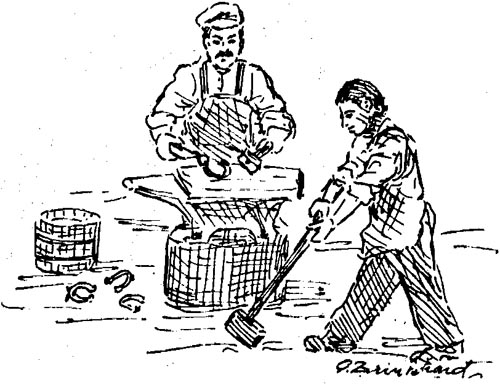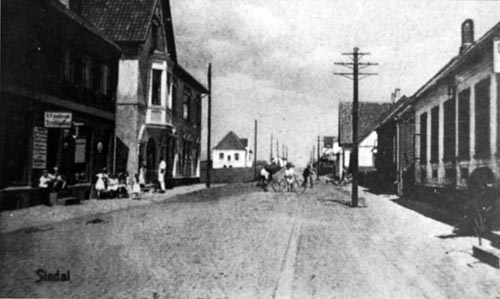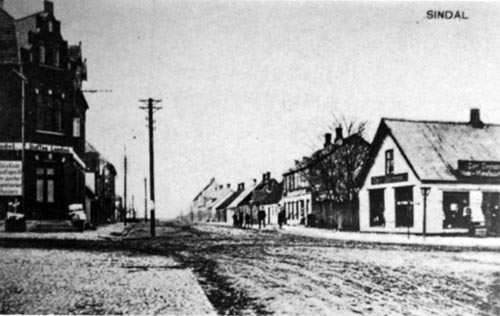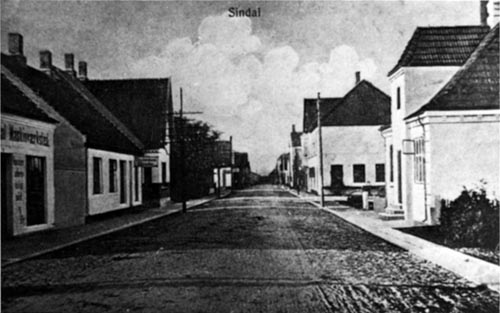Memoirs
Part Two
Martinus
You were also to be confirmed!
Yes, it was in the summer of 1904. First I had to go to the priest. I very much liked going to him. He had a lovely presbytery with a large garden. There were children from two schools; we sat in a room opening onto the garden with the doors open. I was very fond of Bible History and was the first to answer when the priest asked about something.
But one day just so that I shouldn't become far too important, I was tested on one of the hymns that I couldn't remember properly. The priest had to help me twice; it was very embarrassing.
The priest was a staunch member of the Inner Mission (An evangelical branch of the Church of Denmark); he cursed and swore and always threatened us with hell.
I could not understand that what he said could be right, that a little child who died before it was baptised should suffer eternal damnation, and that there was a curse on children that were born outside marriage. I myself was born outside marriage, but I couldn't believe that Our Lord was angry with me because of that.
I began to doubt that everything the priest said was true.
I was confirmed in October - on 2nd October, if I remember rightly. I was given a very fine set of dark confirmation clothes. It was the first time I had worn a shirt front and collar, but I wasn't used to such stiff clothes. I was given fine shoes too, so I was very elegant.
Were they bought with the 35 crowns you inherited from your mother?
No, that wasn't enough, even though we got much more for our money in those days.
The day after my confirmation I was allowed to put my confirmation clothes on again.
I was to go to Ulstedbo Farm where I was a herd boy. The owner of the farmer wanted to give me a confirmation present. It was also to be a farewell present since I was about to stop working as a herd boy.
At that time it was usual that every farm had a watchdog. Ulstedbo was no exception; the watchdog there was called Faithful. It was very faithful and vigilant, despite the fact that it had gradually become blind.
It could be dangerous for strangers to approach it. But it was always very friendly and trusting with me. But that day was an exception. Since I was wearing my new confirmation clothes I must have smelled differently to what I usually do because when I, as I usually did, went over to clap and pet it, it became very aggressive.
It barked violently and jumped at me.
Before I got out of its reach it had destroyed both the sleeves of my new jacket.
I spoke reassuringly to it and now it realised who it was it had attacked.
It became very unhappy and was quite inconsolable for many days.
After my confirmation I was to become an apprentice. I was asked if I wanted to be a tailor. But I didn't want to. I was then asked if I would like to be a cobbler, but I didn't want that either. I had actually always reckoned on becoming a teacher, but there was no money for that.
I myself don't understand how I got the idea that I should become a blacksmith. But it was my own idea.
So my foster father and I walked the long road to Baggesvogn Farm, where there was a smithy.
It was a 7-8 kilometre walk. The farm was near Kristiansminde. The blacksmith and his wife were from Funen and were actually very nice. He wanted to employ me as an apprentice. I was still to live at home. It must have been in March 1905. I had to get up early every morning and walk 7-8 kilometres - and the same again in the evening on the way home. But I was not sorry about that; I was very fond of the countryside, and the birds had begun to sing.
 When I was 14 years old 1 was apprenticed to a blacksmith. Fortunately it lasted only two months because I wasn't strong enough to swing the sledge hammer.
When I was 14 years old 1 was apprenticed to a blacksmith. Fortunately it lasted only two months because I wasn't strong enough to swing the sledge hammer. But after some time a little room where I could sleep became vacant at the smithy. It was a very small and primitive room, and the bed was the worst I have ever come across. I was not big and strong, and the quilt was so heavy that I almost couldn't turn over in bed. There were some big heavy lumps in the quilt, and it was so cold and clammy in the room.
I didn't like my work in the smithy either. One should strike while the iron is hot, but when I had struck only a few blows with the sledge hammer I was so exhausted that I couldn't lift it any more.
But the blacksmith shouted, "Strike harder, damn you, strike harder!.
I wasn't used to that kind of tone and was very unhappy about it. I was home only on Sundays.
But there were some people who lived in the neighbourhood who had noticed this little fellow who walked along the road crying. They talked to my foster father about it. They thought that it ought to be possible to find another job for me. And at last I was relieved of this job.
There was then no other way out than going into farming.
The rural postman who came to my home had a small farm. I knew him very well; sometimes I helped him deliver newspapers. He could now use such a fellow as me on the farm.
 The pictures show what Sindal looked like when I was a boy.
The pictures show what Sindal looked like when I was a boy. It took me a quarter of an hour to walk to Sindal.
It took me a quarter of an hour to walk to Sindal.He and his wife were terribly kind and decent, so I felt as if I was at home. There I could sleep up in the attic. It was much better than at the smithy. I did odd jobs. I weeded the beets, I looked after cows, I did the milking and many other things.
That was from May to November. I was 15 years old.
After that I got a job with the parish police officer in Sindal. He had a small farm. I was there for two years and there too I did all sorts of odd jobs. I didn't have much time off. I had a room on the farm but it wasn't a good room; it was adjacent to the cow stall. And in the winter I had only the warmth that came from the cows. The room was very damp with water running down the walls. When it was frosty there was ice on the walls; that wasn't particularly pleasant.
But the parish police officer was very a very decent man; he was almost 70 years old.
Some of his cows were to be fed with concentrated fodder and I stood with him up in the hayloft. He filled the fodder into small troughs while saying that this was for Laura, and this was for Bothilde, and this was for Lotte, and so on. It was the cows who had these names and I had to see to it that each cow got its own portion.
Wasn't it the parish police office that you were to teach to ride a bicycle?
Yes, that's right. Every spring he got the idea that he would like to learn to ride a bicycle, but he never learned it. It took place on the main road, which sloped downwards. He sat up on the cycle and tread on the pedals. At that time the bicycles could not free-wheel and he tore off down the road. I was to run (behind him) and hold on to the back of the bicycle. But in the end I couldn't keep up and had to let go. When he realised that I no longer kept up with him he began to wobble and shortly afterwards he fell off onto the side of the road where there was luckily him until I had finished laughing. I was always easily provoked to laughter.
Then he didn't want to cycle more that day. But the next day he was ready to try again ... but with the same result. In the end he gave me the bicycle, which made me very happy. Now I could learn to cycle myself; I learned very quickly.
Besides me there was a farmhand and a labourer on the farm, and this labourer was a drunkard. He had bottles of spirits stored in various places. Every day I had to eat with this half-drunk labourer and the farmhand, and when we were given porridge or soup we had to eat with a spoon from the same plate.
I had very little desire to eat in this way so I often went home and got some of my foster mother's good food.
When I had worked for the parish police officer for two years I resigned. He was sorry I did because he liked me.
He had a daughter who was good at playing the piano. I liked piano music very much and was sometimes allowed to come into the living room, where she played for me. She wanted to teach me to play but a stop was put to that. It would never have been accepted that a country bumpkin like me could get too close to the parish police officer's daughter.
I left the parish police officer in November 1907. I was 17 years old and now had to find a new job.
The youngest of my foster brothers was employed at a large farm near Køge. He told me that I could also get work there, if I wanted. I wanted to see something new, so I left Jutland and ended up at this farm on Zealand. If I remember rightly it was called Tureby Farm. Here my foster brother and I were employed as apprentices to the herdsman. There was also a third apprentice; he was the son of the Master of the Royal Hunt.
On the farm there were a couple of milkmaids who were not Danish. They were Polish or Russian, if I remember rightly, and they couldn't speak Danish. The herdsman was very brutal and he treated the two foreign girls like dogs. One evening they were given a beating. My foster brother and the other apprentice witnessed this and would not tolerate it. They threatened the herdsman with a hiding and complained to the proprietor. But the proprietor could not see that the girls had got anything other than what was good for them.
So that was the end of our stay there. We left immediately. It was around Christmas-time 1907.
I spent Christmas in my childhood home with my foster parents.
And now I wanted to be a dairyman.
In the course of the following ten years I worked as a dairyman in a series of dairies around the country. I applied for a vacancy at Høgholt Dairy near Sindal. I got the job and began in January 1908. I was there for only three months so I don't have so many memories from there.
I kept my next job seven months. It was at Lønstrup Dairy. It was a little private enterprise belonging to a farmer. There were only three of us at the dairy: a manager, a dairymaid and me. We began work early in the morning and were finished by lunchtime. But then we helped the dairymaid. She and the manager were girlfriend and boyfriend. But things were very much up and down with them; the one moment they were in love and the next they were fighting so that the house shook. We sold some milk directly to the neighbours, and one day the manager had, in the dairymaid's opinion, chatted a little too much with a young girl who was buying milk. A little later, when he was sitting at his writing desk, his girlfriend tiptoed in and poured a bucket of water over him. She thought that he needed cooling down.
The dairy's machinery was very dilapidated but there was no money to replace it. Many small dairies bought used centrifuges, boilers and other dairy equipment that had been thrown out by larger dairies. The steam engine's regulator didn't work - it sat there merely as a form of decoration - and the boiler was far too small. In order to increase the pressure of the steam in the boiler we put a weight on the security valve. It helped the pressure, but it was both dangerous and illegal.
Sometimes a strop broke off and the machine went out of control. We had to rush to turn off the steam.
And the centrifuge was lopsided and made so much noise sometimes that the coachmen who had come to collect the milk tiptoed outside. They had heard stories from other places about boilers that had exploded and had gone through the wall landing far out into the field.
Sometimes a factory inspector came to inspect the dairy. When the manager saw him down in the yard he rushed to find the boiler book. In the book he was supposed to continuously write down how many times the machine had been running. But he neglected this, and now he rushed to scribble something in the book. When the inspector was given the book he could see that someone had just written in it. But he said only, "Well, you have certainly been busy!", and left it at that.
-----------------------------------
To be continued in Part Three
>> © Martinus Institut 1981, www.martinus.dk
You are welcome to make a link to the above article stating the copyright information and the source reference. You are also welcome to quote from it in accordance with the Copyright Act. The article may be reproduced only with the written permission of the Martinus Institute.



